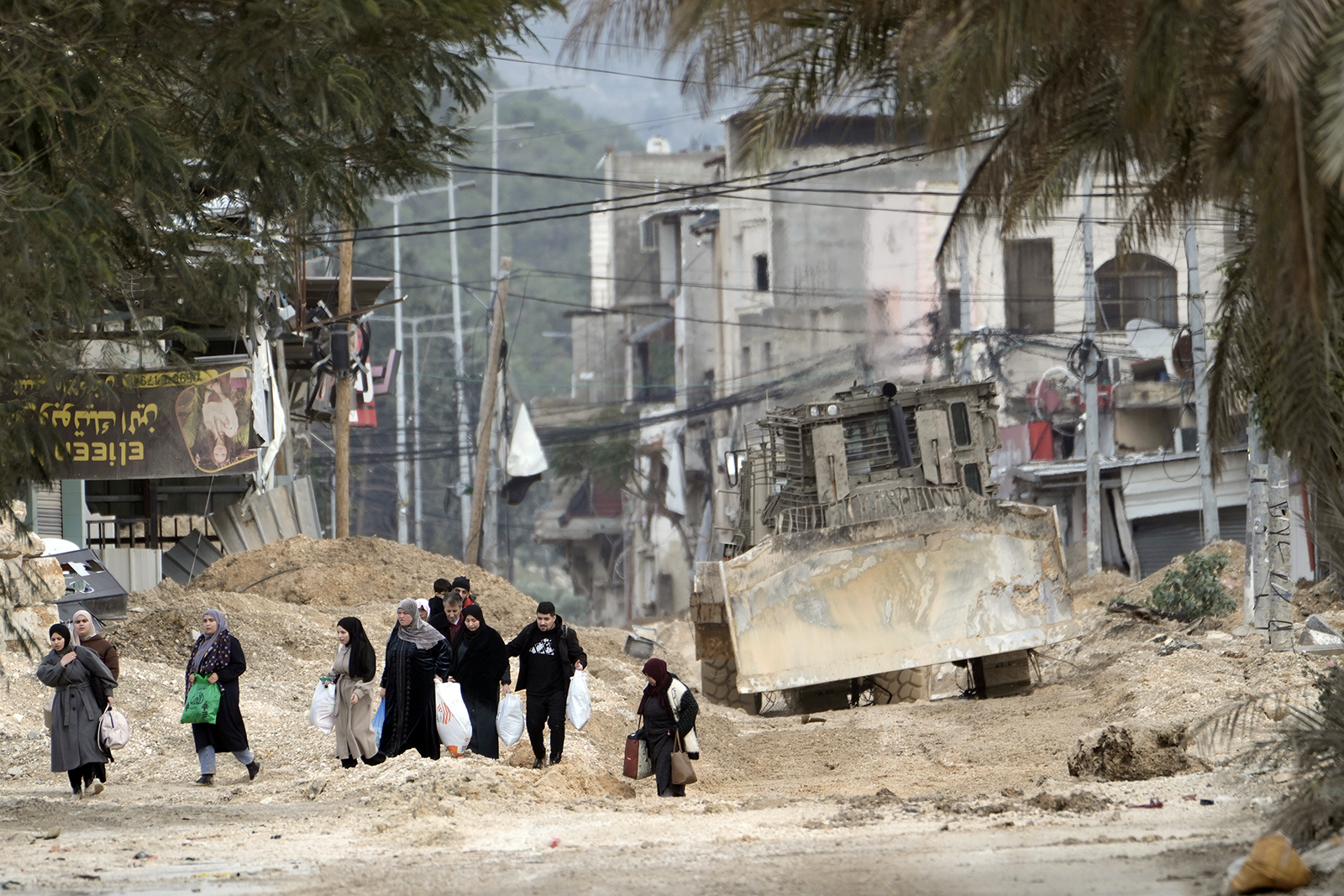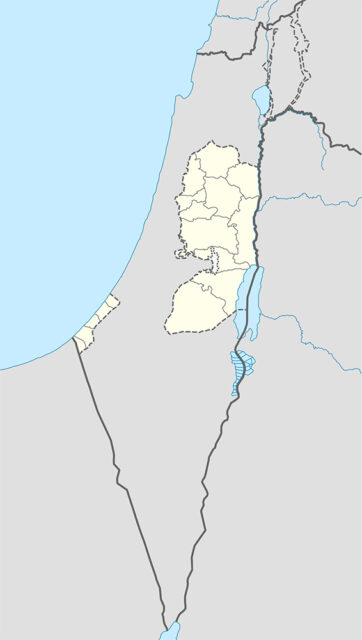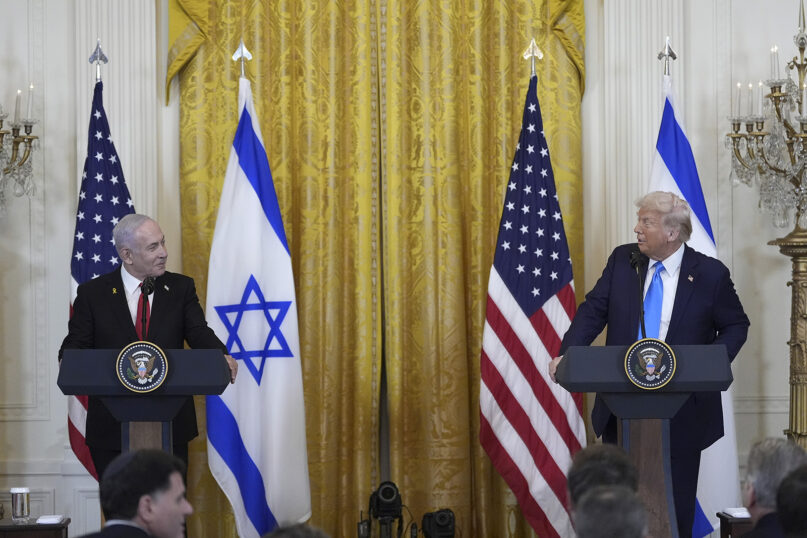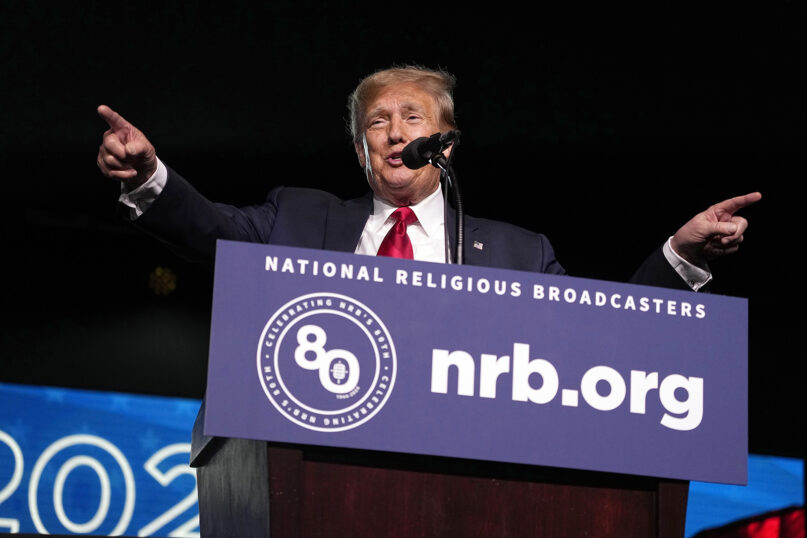
(RNS) — President Donald Trump began his second term in the White House with a bit of political map-making, changing the official U.S. name of the Gulf of Mexico to the Gulf of America.
Now, Christian broadcasters and members of Congress hope Trump will do something similar for Israel by renaming the West Bank as “Judea and Samaria” – a name for the region found in the Bible. That name is mentioned in a bill now before Congress and in a resolution from the National Religious Broadcasters association.
“NRB opposes the use of the erroneous term ‘West Bank’ to describe the biblical heartland of Israel and calls on its members to refer to the region by its historic name of Judea and Samaria,” the NRB, a group of mostly evangelical broadcasters and ministries, said last year in announcing what it called a “Biblical Heartland Resolution.”

A map highlighting the Israeli occupied territories of the West Bank, right, and the Gaza Strip, left. (Map courtesy Wikimedia/Creative Commons)
The West Bank, a region encompassing about 2,185 square miles, was part of the Hashemite Kingdom of Jordan and was captured by Israel in 1967 during the Six-Day War. The region is home to 4 million people, of whom close to 3 million are Palestinians without legal rights.
In early February, Sen. Tom Cotton of Arkansas and Rep. Claudia Tenney of New York, both Republicans, reintroduced legislation to change how the U.S. government refers to the region. They first introduced the bill in December 2024.
If enacted as a law, the legislation would require U.S. documents to refer to the area as Judea and Samaria, biblical names for the ancient Israelite kingdoms of Judah, also known as the Southern Kingdom, and Samaria, a part of the Kingdom of Israel, also known as the Northern Kingdom.
“The Jewish people’s legal and historic rights to Judea and Samaria goes back thousands of years,” Cotton said in a press release. “The U.S. should stop using the politically charged term West Bank to refer to the biblical heartland of Israel.”
Tenney added that the bill is part of her support for Israel’s rule over the region and her opposition to it as Palestinian state.
“I remain committed to defending the integrity of the Jewish state and fully supporting Israel’s sovereignty over Judea and Samaria,” she said in a statement.
Tenney also launched a “Friends of Judea and Samaria Caucus” in mid-January with support from Tony Perkins, head of the Family Research Council, a conservative evangelical advocacy group.
Next week, a group called American Christian Leaders for Israel — which includes the NRB, pastors and other groups — plans to issue a resolution that supports Israel’s claim to the region during the NRB’s annual convention in Dallas. The group’s statement is meant to show support for Cotton and Tenney’s legislation, and to send a message to the White House about evangelical support for Israel.

President Donald Trump and Israeli Prime Minister Benjamin Netanyahu speak during a news conference in the East Room of the White House, Feb. 4, 2025, in Washington. (AP Photo/Alex Brandon)
ACLI organizers believe Trump plans to make a major statement on Israel soon — and hope that a name change is part of that statement, said a spokesperson for the International Christian Embassy Jerusalem’s U.S. branch, a pro-Israel organization that is part of the International Christian Leaders for Israel, a related group that will participate in the NRB convention.
“ICEJ USA has not discussed the issue with the White House, but we would hope that the administration would acknowledge the historical identity of the biblical heartland by rightly referring to it as Judea and Samaria,” the spokesperson said.
The White House did not immediately respond to a request for comment on Thursday (Feb. 20).
The Cotton-Tenney legislation, supporters argue, simply returns the area to a long-held name.
“Yes, we do support this legislation as it reflects more accurately the historic identity of the region dating back to biblical times,” the ICEJ USA spokesperson said.
But some scholars say that’s inaccurate. The biblical Judea and Samaria is far larger than the West Bank and includes parts of the Galilee in Israel’s north as well as Jerusalem and the South of Israel.

A general view shows the West Bank Jewish settlement of Efrat on March 10, 2022. (AP Photo/Maya Alleruzzo, File)
“To say Judea and Samaria is completely inaccurate if you’re referring to the area between the 1949 armistice line and the Jordan River,” said Ian Lustick, a retired political scientist from the University of Pennsylvania and a Middle East scholar.
The region does include a number of sites mentioned in the Bible, such as Bethlehem and Jericho, that are in the West Bank. It is also the home of the Palestinian Authority governing body based in the West Bank city of Ramallah, as well as the Palestinian cities of Jenin, Nablus and Tulkarm.
Since the West Bank’s capture by Israel in 1967, more than 120 Jewish settlements, considered illegal under international law, as well as nearly 200 pastoral outposts, have been built as settlers seize more and more land from Indigenous Palestinians.
In a statement, Josh Reinstein, president of the Israel Allies Foundation, a pro-Israel advocacy group, cited the presence of biblical sites as part of the rationale for Israel’s rule over the region. Reinstein will host an event at the NRB where the resolution will be signed.
“Everywhere I go, Bible-believing Christians are speaking about the real possibility for Israeli sovereignty in Judea and Samaria,” Reinstein said in a statement. “With President Trump’s statement on the issue only a week or two away, many Christians believe that they could be witnessing the fulfillment of biblical prophecy, yet again.”

Republican presidential candidate former President Donald Trump speaks at the National Religious Broadcasters convention at the Gaylord Opryland Resort and Convention Center on Feb. 22, 2024, in Nashville, Tenn. (AP Photo/George Walker IV)
Evangelicals have long been among the most active and loyal supporters of Israel — and have become particularly vocal about their support of the country during the Israel-Hamas war. The NRB’s convention has long been a gathering spot of pro-Israel evangelicals, drawing Israeli officials, pro-Israel ministries and Holy Land tourist companies. During the 2024 convention, Israeli officials showed footage from the Oct. 7, 2023, Hamas attacks on Israel, while families of hostages spoke to attendees and the media about the plight of their loved ones.
The 2025 NRB convention will feature an “Israel War Room” exhibit, “an immersive and powerful space that reveals the critical battle for Israel’s biblical heartland,” according to its website.
“Walk through the lands of Abraham, David and the prophets – where ancient cities like Hebron, Bethel, and Shiloh still pulse with life today,” the website promoting the War Room states, referring to the West Bank, not the war in Gaza. “Experience the reality of life in Judea and Samaria – from the personal stories of brave Israeli settlers to the strategic importance of these biblical lands.”
The Christian Zionist move to refer to the land by its biblical names follows Israel’s long practice of renaming geographical areas in historic Palestine. The practice stretches back to when Israel first captured Arab villages and then changed their names to Hebrew names. That practice was sanctioned by Israel’s first Prime Minister David Ben-Gurion, who changed his own last name from Grün to Ben-Gurion to mask his Polish origin and give him a sense of historical belonging to that land.
Atalia Omer, a professor of religion, conflict and peace studies in the Keough School of Global Affairs at the University of Notre Dame in Indiana, said the process of laying claim to the land by endowing it with a biblical reference has accelerated in recent decades.
“There’s been so much of this use of biblical archaeology as a way of reclaiming the space,” Omer said.
However, it also obscures its present-day population, in this case the predominantly Palestinian residents of the West Bank.
“Those practices of using biblical archaeology transform the map and the material realities and completely erase Palestinian presence,” Omer said. “When you rename it, that’s a form of replacing the natives, which is one of the dimensions of colonialism.”
